If you were to look at my gaming stats for 2023, 2024 and 2025 so far, you would see one specific game dominating the stats. That game is Blood on the Clocktower, and I played it 40 times in 2023, 75 times in 2024, and… well, 6 times in 2025 – but I have had a baby recently, so even that figure is impressive.
I actually first played Blood on the Clocktower (BotC) in 2020, at online megagame convention OMG Con. I really enjoyed it at the time, but it would be two and a half years until I played it again. A friend bought a copy and invited us over to play it and… that’s it, I was hooked.
But what is Blood on the Clocktower, and why do I think it’s such a fantastic game that absolutely everyone should play?
What is Blood on the Clocktower?
Blood on the Clocktower is a social deduction game for 6-21 people (5-20 according to the box, but you need a GM, also known as a Storyteller). The Storyteller has full knowledge of the game state, which they record in the game box, known as the Grimoire. They may also need to make choices, and are intended to be impartial to each team and provide a fun and interesting game experience for the players.
Players are split into two teams – Good and Evil – and will have a different objective depending on what team they are on. However, the teams are secret, and you will only know your own team and role, not anyone else’s.
Play begins by each player drawing a token from a bag. If it’s blue, you are on the Good team; red means Evil. The token also reveals your character for the game, and each character has a special power, e.g. the Chef starts knowing how many Evil players are sat next to each other.


In addition to the two teams, there are four character types: Townsfolk, Outsider, Minion and Demon. Townsfolk are Good players with an ability that is beneficial to town; Outsiders, good with a detrimental ability; Minions are Evil players who have an ability to help the Evil team. The Demon normally has an ability to let them kill players, and they are the focus of both teams’ objectives – Good players are trying to kill the Demon, while Evil players are trying to keep them alive until the end of the game. The game ends when only two players are alive.
The game is played in a series of turns, alternating between day and night phases. During the night, players sit with their eyes closed in a circle, and may be “woken” to receive information or select players, depending on their ability. During the day, players are free to chat with other players privately or as a group. Towards the end of the day, players will nominate and vote on a player to be executed each day – this is the main way that Good players find and kill the Demon.
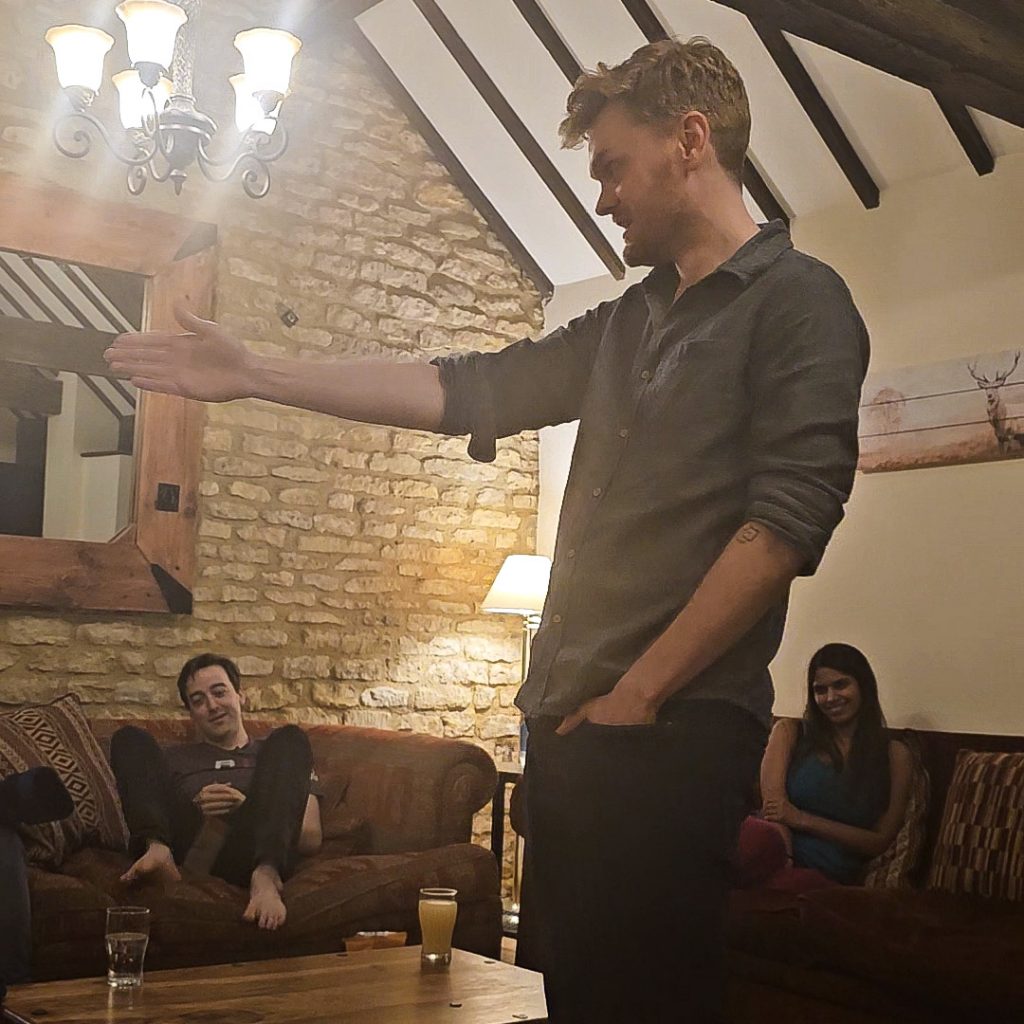
So that’s the fundamentals of the game, though if you really want to know how to play it, I recommend watching this “how to play” video.
But why do I think it’s such an awesome game? There are a few reasons.
1. It’s a really well-designed game
In a way, Blood on the Clocktower has been in development for much longer than the Pandemonium Institute (the game’s designers) have existed. After all, it’s basically old school Werewolf, but with all the annoying bits sanded off!
For a start, death isn’t the end. If you’ve ever played Werewolf or Mafia, you’ll know that it all gets a bit boring after you die, and all the worse if you die on day one. You can’t speak, you can’t vote… you may as well leave, to be honest. But in BotC, dead players can continue to speak and contribute to group discussions. You have one more vote to use before the game end, and if all the dead players save their vote, they can be quite influential when you get down to the final three living players.
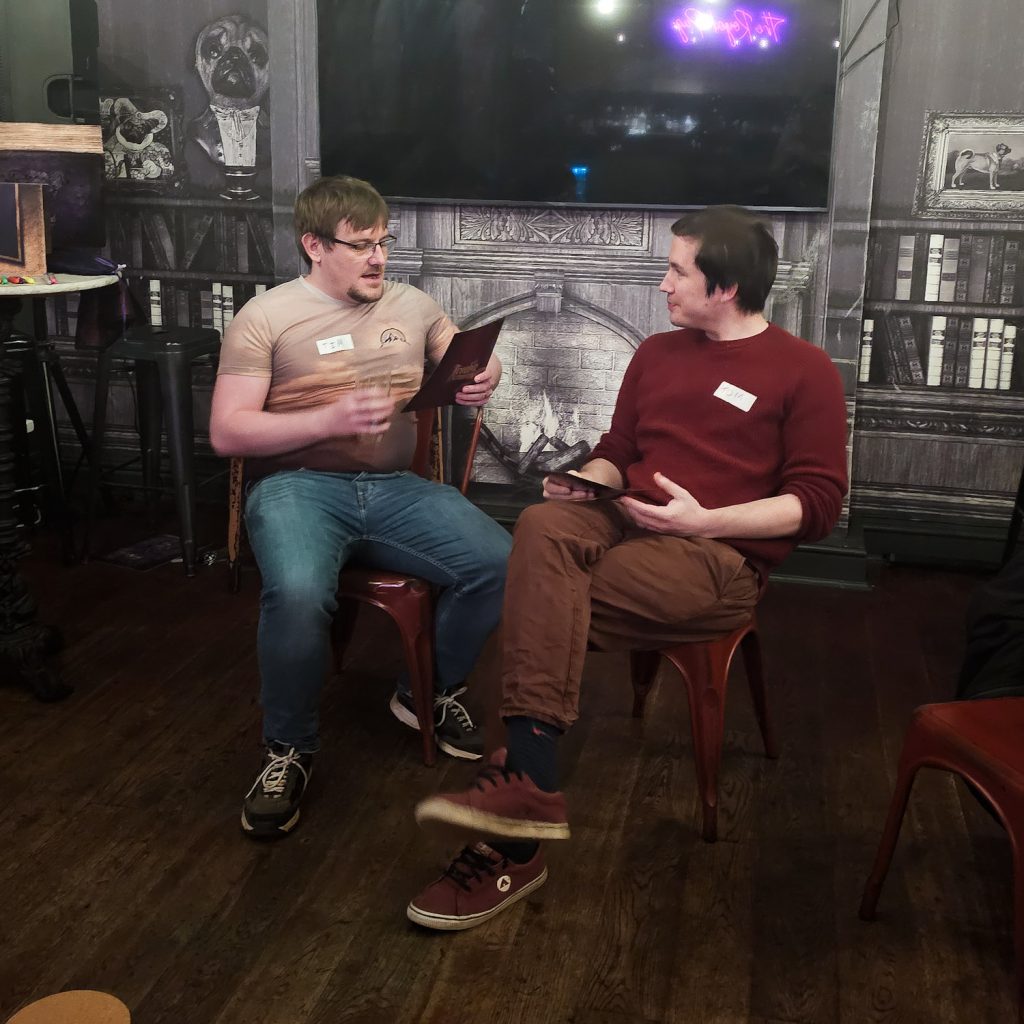
And, while you lose your ability on death, some players even have abilities that trigger on death – such as the Ravenkeeper, who gets to choose a player and find out their character, but only if the Demon kills them at night!
Secondly, every player is special. In most Werewolf games, the majority of players are Villagers, who have no special function. Some players may have a special power, such as Seer, or be a Werewolf, but in BotC, all players have an individual character that does something.
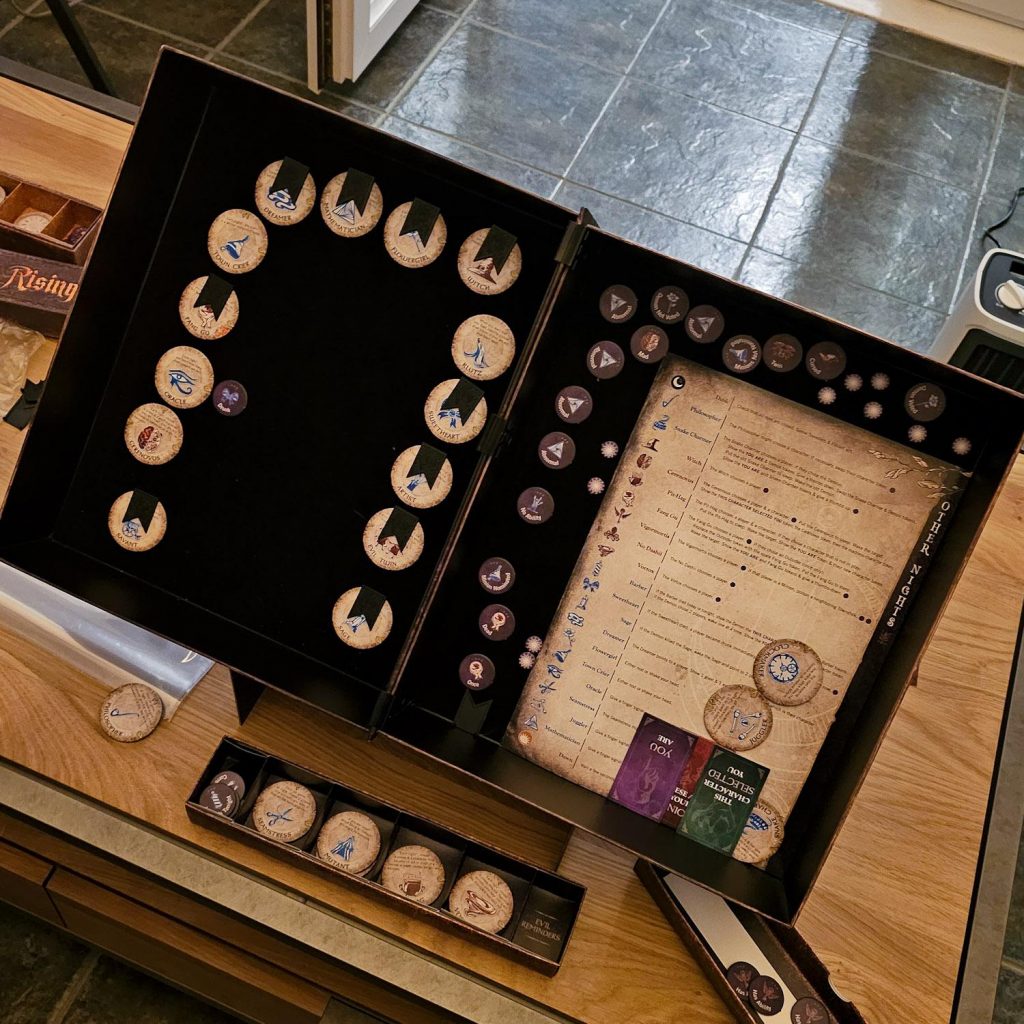
There are some more passive roles, such as the Pacificist, who allows the Storyteller to prevent Good players from being executed, or the Butler, who has to choose a player at night and can only vote when they vote. But even these abilities are crucial to understanding the game make-up and finding the solution to who the Demon is!
2. It’s easy to get started with
The game may sound a little complicated, but it’s very easy to start playing. Firstly, there is always an impartial player who can help newbies get to grips with things – the Storyteller! Their presence means that players can always ask any questions, and not fear they may receive a biased answer due to the game worlds that players are building.
You may think that having so many characters can make it hard to get your head around, but during each game you will only be playing with a limited selection of characters, known as a script. The script lists out all the possible characters, normally 13 Townsfolk, 4 Outsiders, 4 Minions and 4 Demons, although those numbers can vary. And remember – you will draw just a single token from the bag, so most of the time you will actually only need to understand one role!
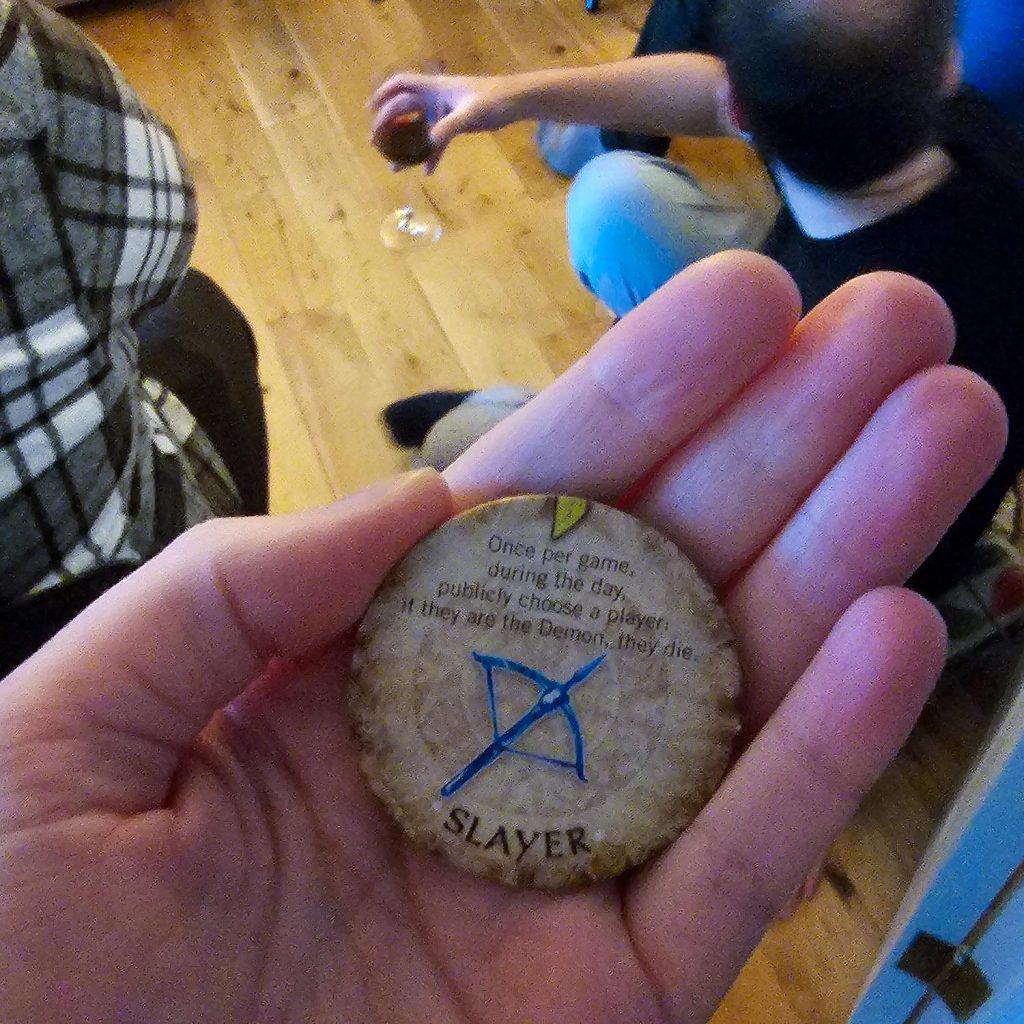
This is a bit different if you happen to be Evil during your first game, at which point you will need to bluff that you are a Good character. The Demon is given three out-of-play roles, so it’s easy for them to choose one of those. Minions can find it a little more challenging, but it’s often easiest to just pick a role and commit to pretending to be that, even if you end up in a “double-claim” with another player. After all, only that person will know which of you is telling the truth, and the other players may believe you instead!
To make it even easier, the game provides a straightforward beginner script, called Trouble Brewing (commonly called TB). It has only one Demon on the script, and most of the other roles are easy to understand. It also happens to be an incredible script to play, that remains enjoyable even for advanced players. Many of my favourite characters are TB ones!
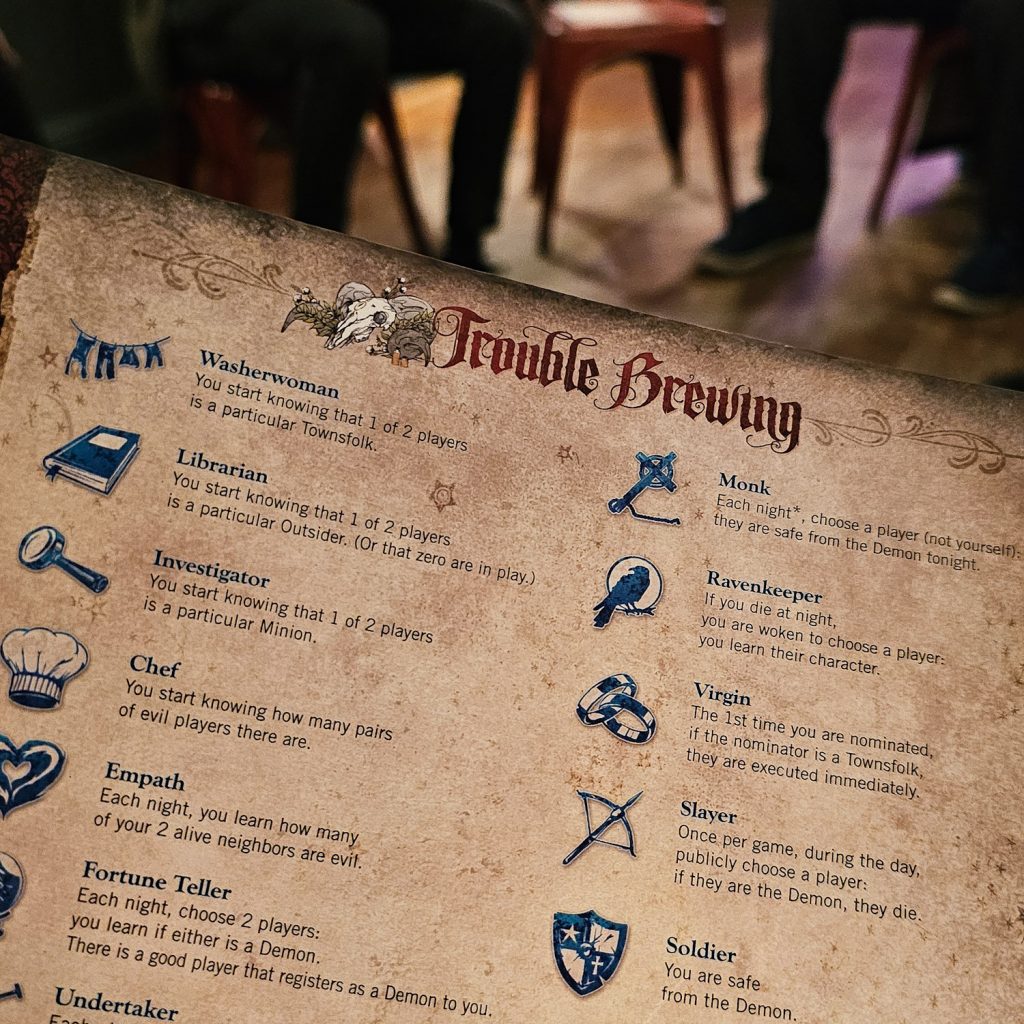
Another way to help get your head around the game is to watch a few of the many many Let’s Play videos that are online! I’d recommend starting with a Trouble Brewing video, rather than one of the more complicated scripts, but watching how players talk to each other, share information while keeping powerful roles hidden, and use logic to work out who the Demon is, can be very helpful as a newbie. At the same time, seeing how to bluff well as an evil player is also useful!
Here are a few videos I’d recommend watching (Trouble Brewing only):
- An in-person game by No Rolls Barred
- An in-person game by The Pandemonium Institute
- An online game using the official BotC app
- An online game by No Rolls Barred
Overall, if you want to understand how to play the game best, I’d recommend watching the videos from the official BotC YouTube channel. Games recorded by board game enthusiasts and/or comedians (such as No Rolls Barred), while very amusing to watch, may not have the best strategies which are often found on the official channel!
One top tip for newbies – as soon as you know your role, check out the Blood on the Clocktower wiki page for the character. It will give you tips on how to play as your role, and can help you hit the ground running!
3. There’s a huge amount of possibilities
One of the most exciting things about Blood on the Clocktower is its replayability. No two games are the same, even using the base script of Trouble Brewing. My husband generally only plays Trouble Brewing if he can, as he finds it most interesting to delve into the characters he understands well.
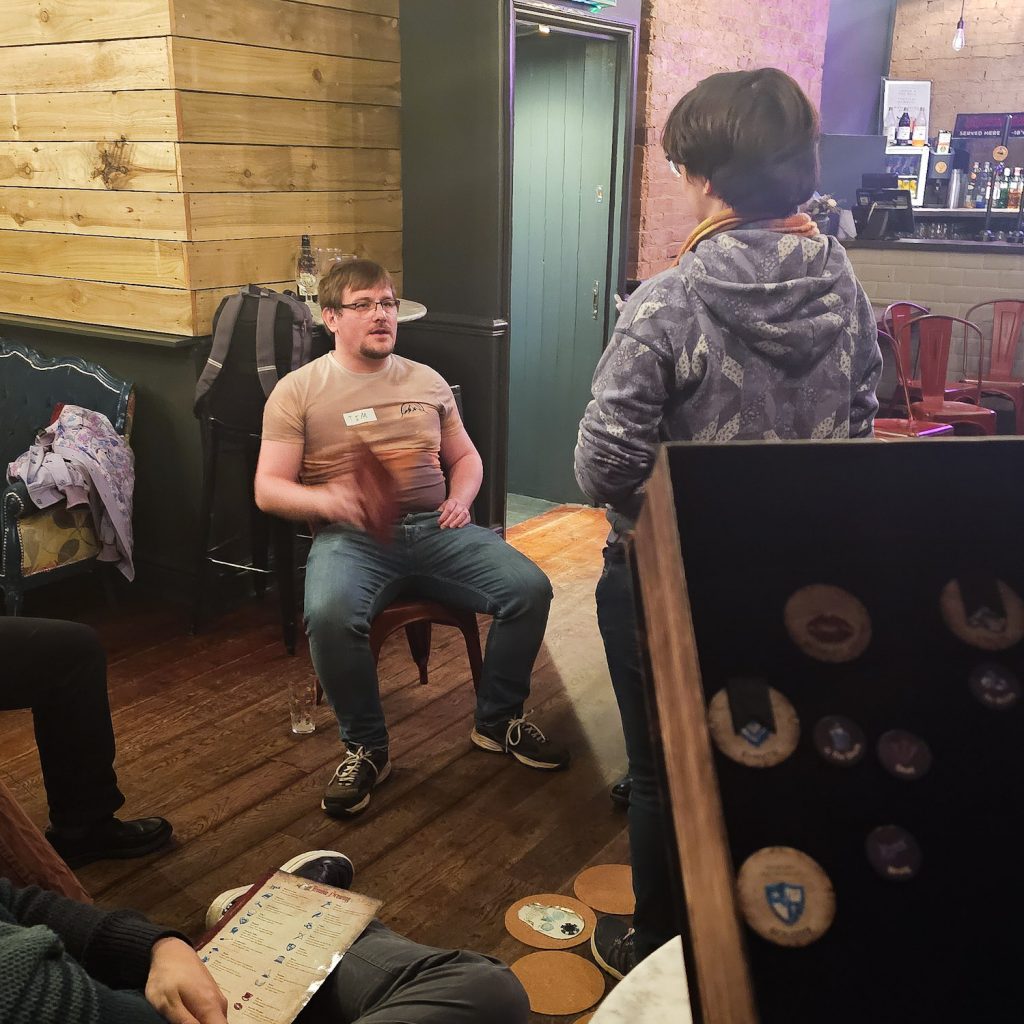
However, if you want to go beyond TB, you have a host of options. Let’s start with the other scripts that come with the base game: Sects and Violets (SnV) and Bad Moon Rising (BMR). Along with a whole new host of characters, these scripts also introduce interesting new mechanics. SnV introduces madness, increasing the reasons that good players may need to lie about their character. BMR, meanwhile, has a lot more ways for players to die or survive death, and you learn how to gain information by unravelling the reasons people did (or didn’t) die.
It doesn’t stop at these “base 3” scripts, however. Since releasing the original game, the Pandemonium Institute have released more than 50 experimental characters. These give rise to a huge number of new interactions and play styles – such as the Organ Grinder who hides votes as they’re being cast, or the Yaggababble, a demon who kills by saying a certain phrase out loud.
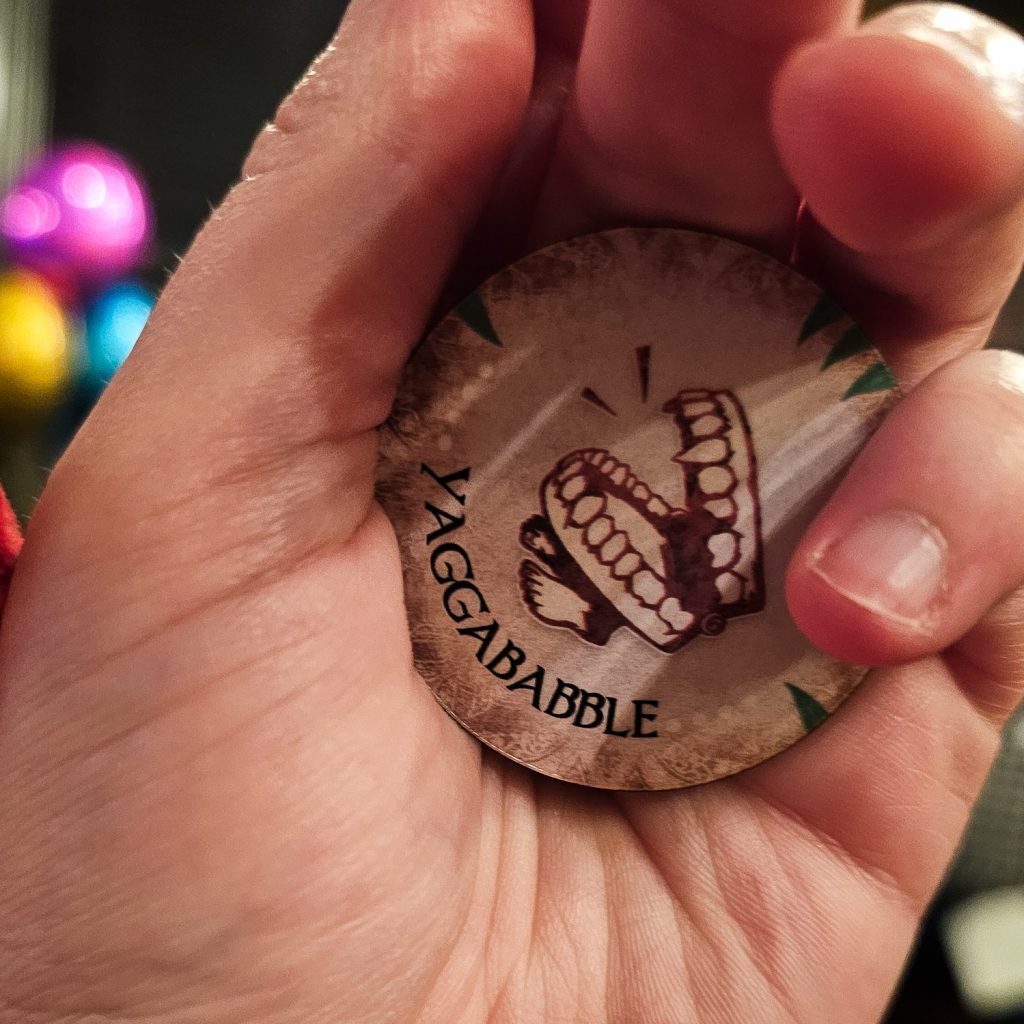
And of course, custom scripts have been created by BotC enthusiasts, allowing you to play with various combinations of base 3 and experimental characters. So if you get bored of the base 3 scripts, there are endless additional ways to enjoy the game.
4. The design space is exciting
Designing custom scripts is the first step an enthusiast can take in getting involved in BotC design (and indeed, the only one I’ve done so far). But there are more.
Homebrew characters refer to unofficial ones designed by fans. The Pandemonium Institute has announced a pause on experimental characters so it can prepare its next series of official scripts for release. But that hasn’t stopped players from coming up with innovative new character ideas themselves. There are even some well-known entirely homebrew scripts, such as Fall of Rome.
You can even design completely custom rules to apply to your script, using a feature called the Bootlegger. In fact, there is currently a World Cup of scripts taking place, where various scripts with unique rules are competing against one another in a series of streamed games. It’s my main YouTube obsession right now!
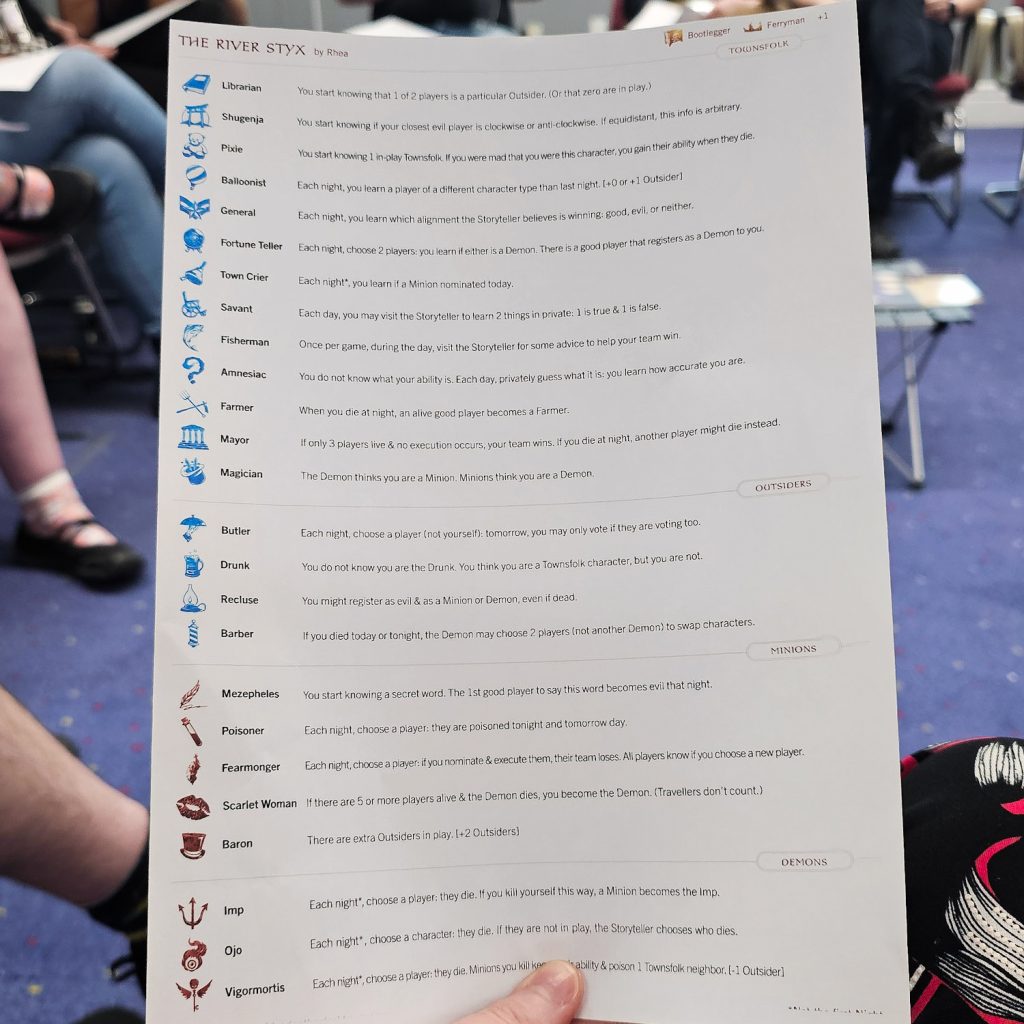
5. Running the game is just as fun
Or maybe even more fun! Storytelling is one of my favourite ways to enjoy the game, and I frequently volunteer for it both among my friends and when I go to local meetups.

The role of the Storyteller is an interesting one. The game cannot run without you – one person needs to have perfect knowledge of the game in order to do things like trigger Virgin executions, give out Empath information and announce the game is over when the Demon is killed.
However, it’s not a simply mechanical function. The Storyteller’s decisions have a huge impact on the way the game is run. To start with, they choose which tokens go into the bag for players to draw. They also make decisions throughout the game, such as whether to misregister a Recluse as a demon to the Fortune Teller. If players become drunk or poisoned, their ability misfunctions, and the Storyteller can decide whether or not to give them true information. And for custom characters this can go even further – the Storyteller gives advice to the Fisherman, chooses the kills for the Yaggababble and even decides whether or not the Politician wins the game with evil!
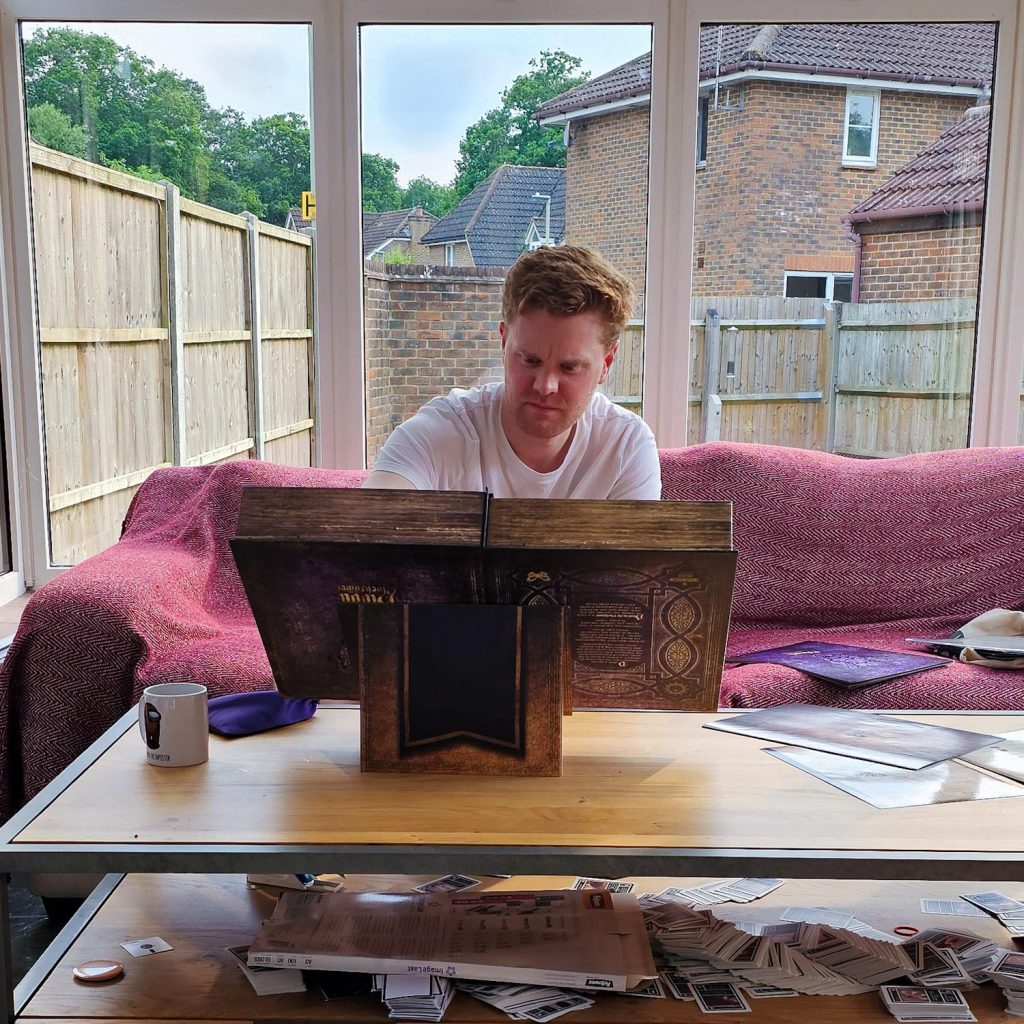
It’s a fine art to be a good Storyteller – one I believe I do fairly well, but I’m still learning!
6. The community is lovely
As you may know from my Why I Megagame post, the people who play a game are often a big part of the reason I enjoy it. While I haven’t found my BotC tribe in the same way that I have at megagames, I’ve met a huge number of very lovely fellow players.
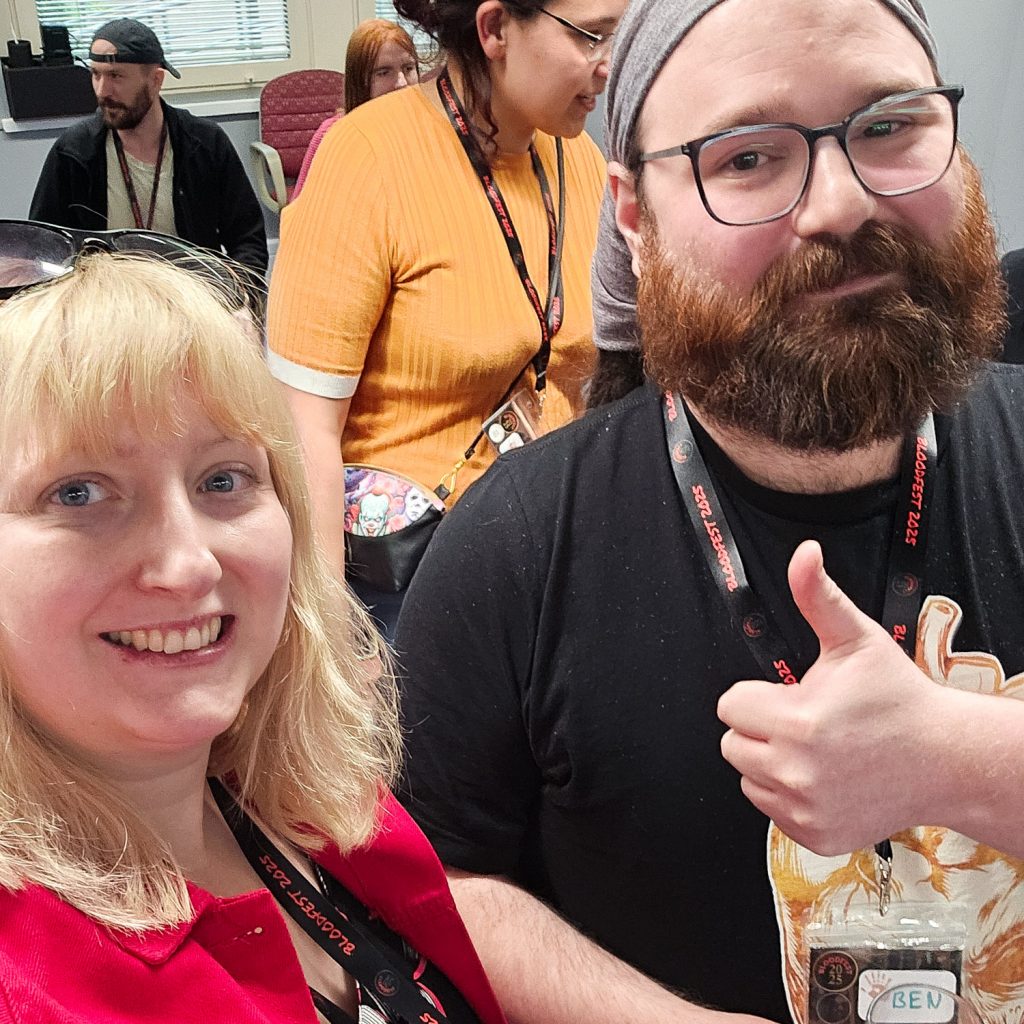
For a start, there are a lot of local groups where you can play the game in person. Leamington Spa is lucky enough to be home to two current groups. The one at the Dice Box, which I frequented pre-baby, runs one . The other, called Clocktower Leam, runs two sessions a month, and I try to prioritise it for my baby-free evenings!
There are tons of groups running games in towns and cities around the UK, and the Blood on the Clocktower UK Facebook group is a good place to find local events.
But BotC is also playable online! Thanks to the fantastic official app, you can play BotC for free online (if your Storyteller is using a paid-for version), or you can pay a small amount to the creators for an upgraded account. The app lobby has various public games you can join. There are also various BotC Discord channels available to help you find games with people, such as the Unofficial BotC Discord or the Grimoire. And you can also use the app to run private games with your friends.
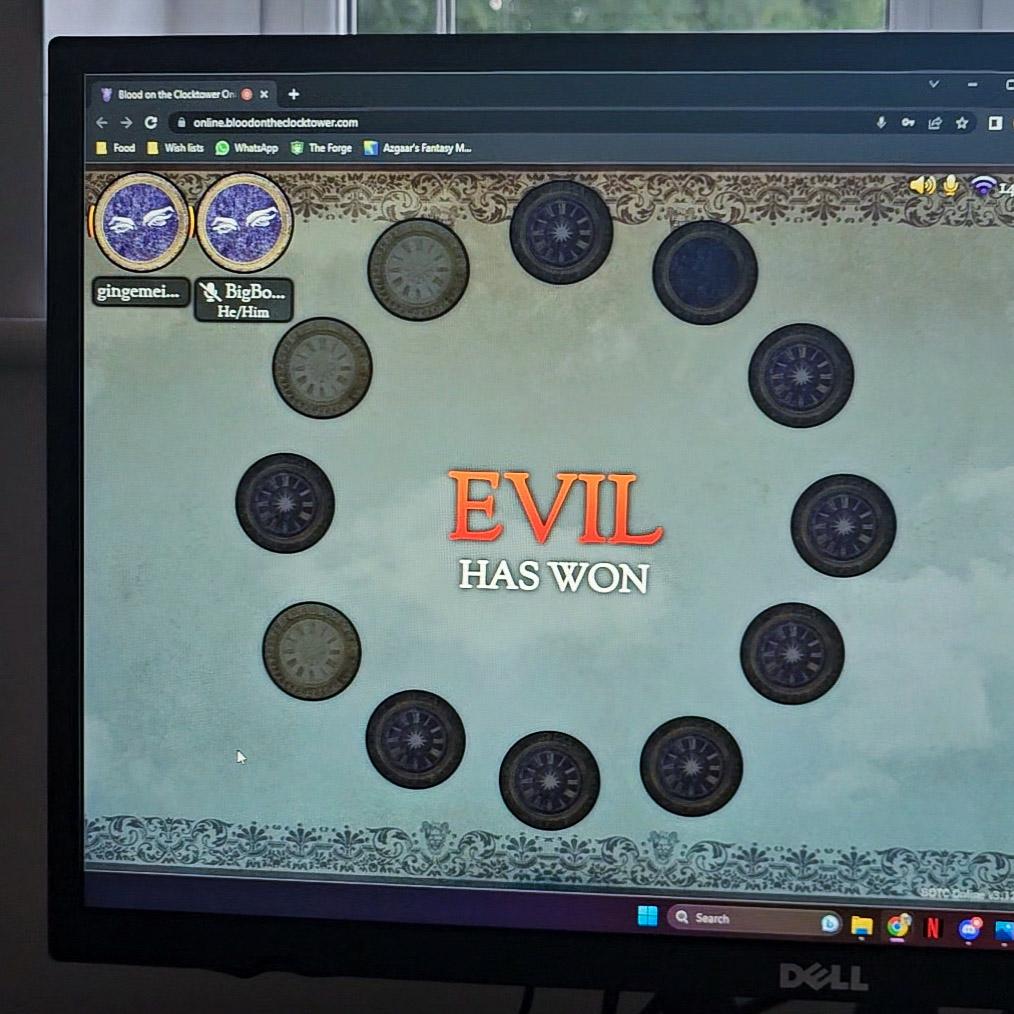
And did I mention there are conventions? Like many other geeky hobbies, various conventions have sprung up, where you can head to a conference centre and play BotC all weekend. I attended Bloodfest in Milton Keynes a few weeks ago and played in four excellent games (won two, lost two).
I’m heading to Good Llleech Con in Telford in October. It’s a great way to spend a day or three with other Clocktower obsessives, packing in a bunch of good games!
And if you’re going to UK Games Expo in a couple of weeks time, there will definitely be some BotC games going on there. It’s a great opportunity to give it a go if you’re on the fence.
Quick questions
Q: Favourite role?
A: It has to be the Virgin – even though it’s a “basic” Trouble Brewing character, I love how it hard confirms both themselves and another player!
Q: Favourite evil role?
I do prefer being good, but if I’m evil I much prefer to be a Minion than the Demon – tons less responsibility! I quite like the Cerenovus as it’s can be a powerful role but if you die it’s not a big deal. And it’s lots of fun making other players lie!
Q: Which of the base 3 scripts do you like best?
A: I really like Trouble Brewing, but honest I think Bad Moon Rising may just slightly edge it out – I like the multiple demon options and characters like the Gossip and the Sailor really appeal to me.
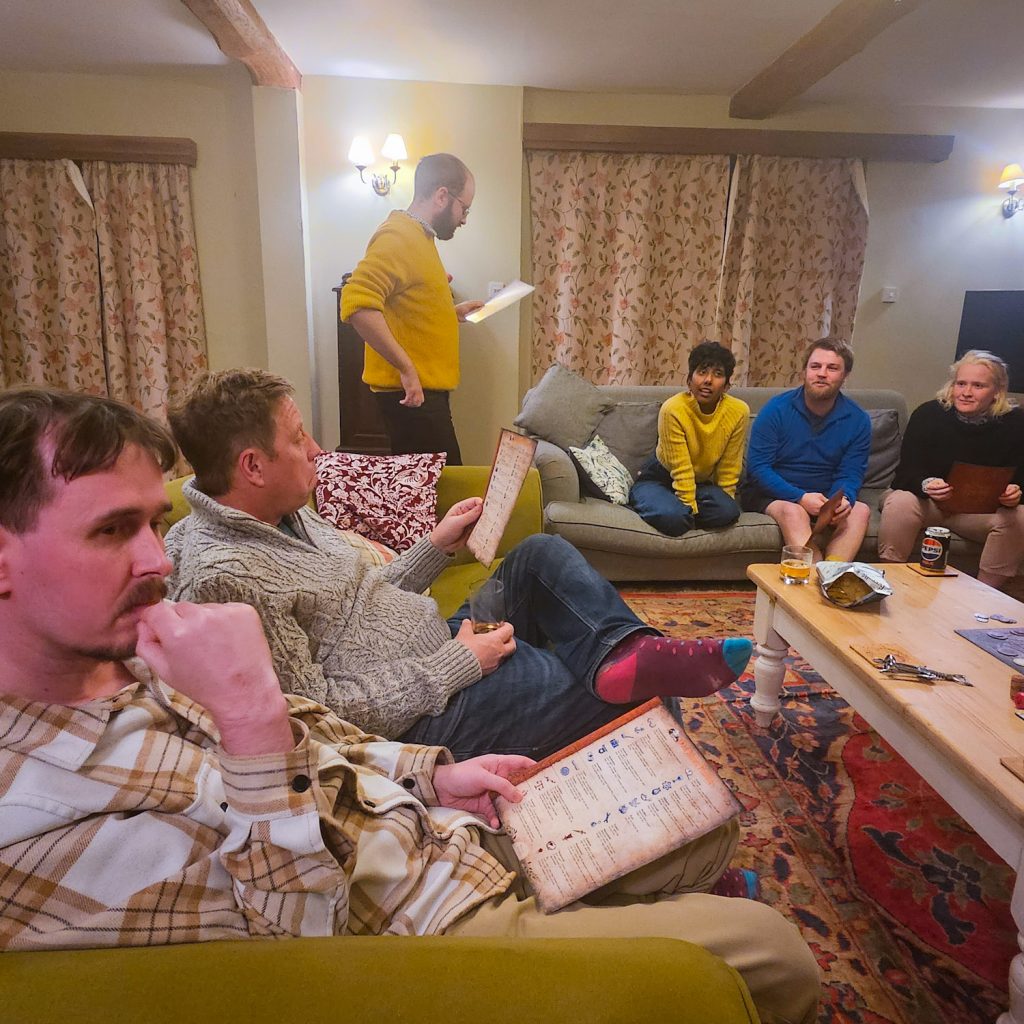
Q: Do you prefer playing or storytelling?
A: Playing with experienced players, and storytelling with newbies.
Q: Best moment playing Clocktower?
A: The reason I love Virgin so much – I was playing “blind TB”, where you don’t get to see what token you drew from the bag. A bunch of players nominated each other (to “Virgin check”) or Slayer shooting random people. Then, a few days into the game, someone nominated me – and that was how I discovered I was the Virgin!
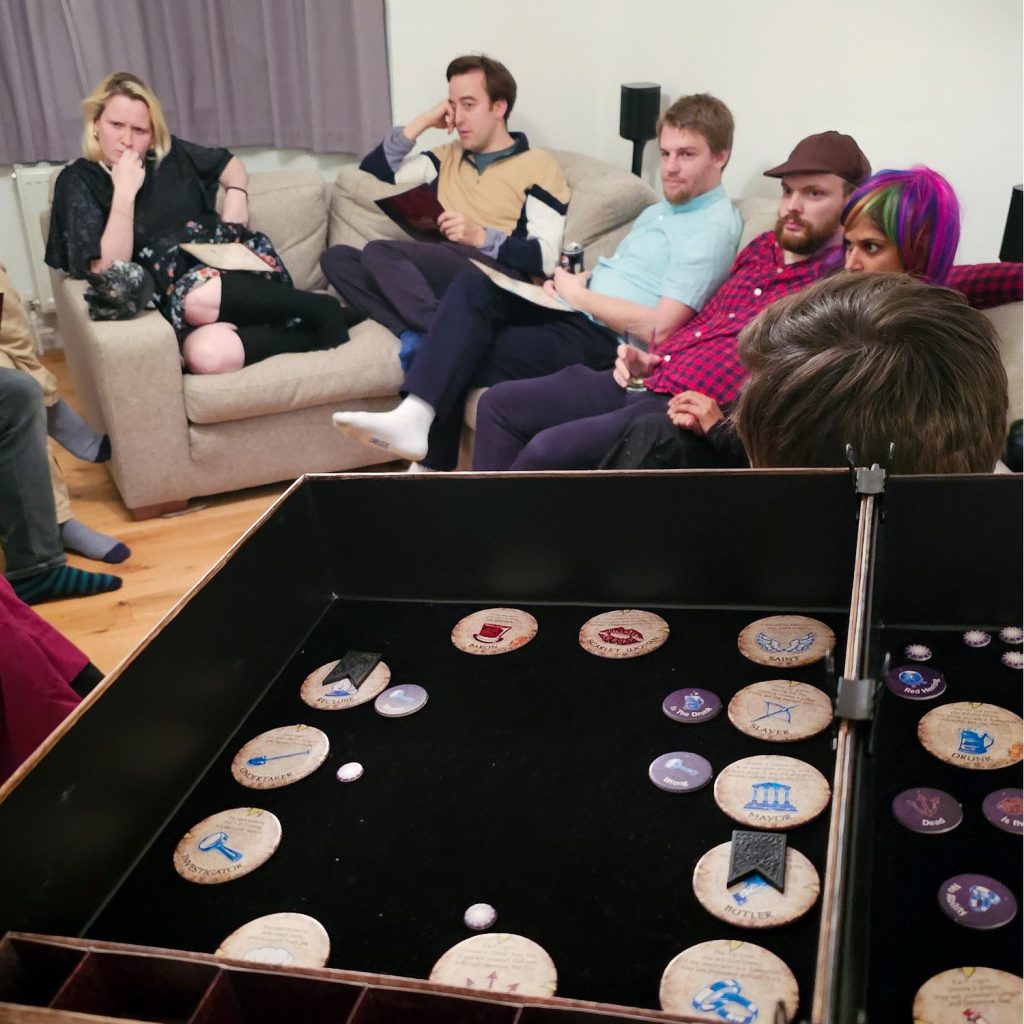
Q: Moment of Clocktower shame?
A: Revealing to the Magician who the Demon was on day one!
Q: What’s your win rate?
A: According to my Board Game Stats app (where I’ve been tracking all my games since 2021), I’ve played 99 games and Storytold 22. Of the 99 that I played, I’ve won 53 of them, so that’s a 54% win rate… which is better than average, yay!
How to start playing
Either find a local group via the Facebook group, join a Discord server such as the Unofficial one, or just hop into the official app!
Do you play Blood on the Clocktower? What’s your favourite role?
